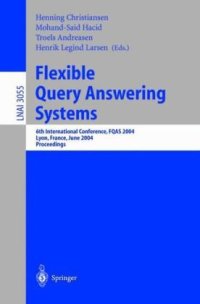
Ebook: Flexible Query Answering Systems: 6th International Conference, FQAS 2004, Lyon, France, June 24-26, 2004. Proceedings
- Genre: Education // International Conferences and Symposiums
- Tags: Artificial Intelligence (incl. Robotics), Information Storage and Retrieval, Information Systems Applications (incl.Internet), User Interfaces and Human Computer Interaction, Database Management, Business Information Systems
- Series: Lecture Notes in Computer Science 3055 : Lecture Notes in Artificial Intelligence
- Year: 2004
- Publisher: Springer-Verlag Berlin Heidelberg
- Edition: 1
- Language: English
- pdf
ThisvolumeconstitutestheproceedingsoftheSixthInternationalConferenceon Flexible Query Answering Systems, FQAS 2004, held in Lyon, France, on June 24–26, 2004. FQAS is the premier conference for researchers and practitioners concerned with the vital task of providing easy, ?exible, and intuitive access to information for every type of need. This multidisciplinary conference draws on several research areas, including databases, information retrieval, knowledge representation, soft computing, multimedia, and human-computer interaction. With FQAS 2004, the FQAS conference series celebrated its tenth anniversary as it has been held every two years since 1994. The overall theme of the FQAS conferences is innovative query systems aimed at providing easy, ?exible, and intuitive access to information. Such systems are intended to facilitate retrieval from information repositories such as databases, libraries, and the Web. These repositories are typically equipped with standard query systems that are often inadequate for users. The focus of FQAS is the development of query systems that are more expressive, informative, cooperative, productive, and intuitive to use.
This book constitutes the refereed proceedings of the 6th International Conference on Flexible Query Answering Systems, FQAS 2004, held in Lyon, France in June 2004.
The 35 revised full papers presented together with 3 invited papers were carefully reviewed and selected from more than 100 submissions.
The papers are organized in topical sections on knowledge representation; knowledge discovery and data mining; domain modeling, ontologies, and human interaction; computational linguistics and natural language processing; Web services, databases; information retrieval; and logic and artificial intelligence.